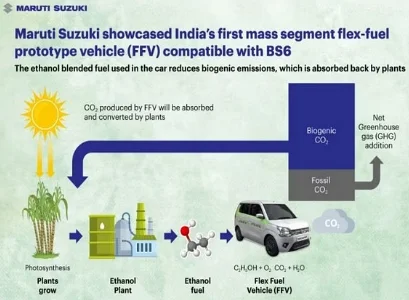![]() June 14, 2024
June 14, 2024
![]() 2111
2111
![]() 0
0
Flex-fuel vehicles, or FFVs, are cars that can use different types of fuel, like ethanol or methanol, along with gasoline. They’re made with special parts to handle these fuels, offering drivers more choices. In India, a collaboration between IIT Delhi, Indian Oil Corporation, and Ashok Leyland created the DOST, a diesel vehicle that can also run on a mix of diesel and dimethyl ether (DME). This helps reduce pollution and dependence on traditional fuels.

Advanced Fuel Systems: FFVs are equipped with sophisticated fuel injection and engine management systems that can detect the type of fuel blend being used and adjust the fuel injection and combustion processes accordingly.
Collaboration: Indian Institute of Technology (IIT) Delhi’s Department of Energy Science and Engineering (DESE), Indian Oil Corporation (IOC) Research and Development Wing, and Ashok Leyland Ltd. joined forces to develop flex-fuel vehicle (FFV) technology.
Ignitability: DME possesses a higher cetane number (~58) compared to conventional diesel (51), indicating superior ignitability.
Emissions: The transport sector heavily relies on fossil fuels, contributing significantly to greenhouse gas emissions.
| Must Read | |
| Current Affairs | Editorial Analysis |
| Upsc Notes | Upsc Blogs |
| NCERT Notes | Free Main Answer Writing |
Flex-fuel vehicles, such as the DOST, are a big step towards cleaner transportation.
By running on alternative fuels like DME or ethanol blends, they cut down on pollution and lessen our reliance on fossil fuels.
| Related Articles | |
| Electrified Flex Fuel Vehicles | Biofuels |
| ENVIRONMENTAL POLLUTION: CAUSES, EFFECTS AND SOLUTIONS | Temperature Measurement: Method, Variation, Laboratory & Clinical Thermometers |
<div class="new-fform">
</div>
Latest Comments